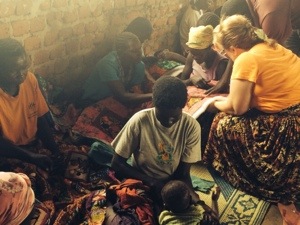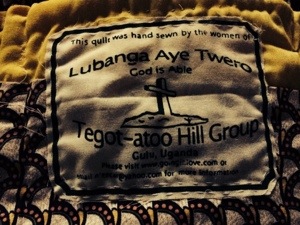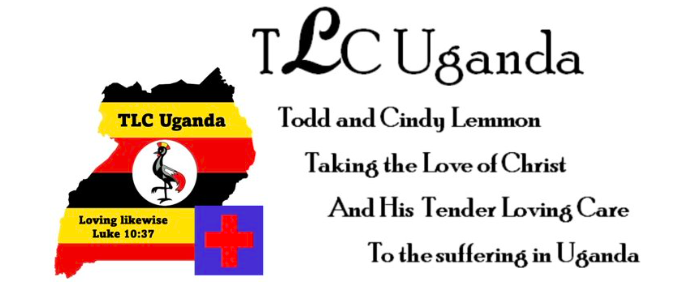Day Eight, April 22:
Nancy Cardoza, the founder and director of Going In Love Ministries, opened her home to us. She fed us local cuisine, and it was better breakfast than I remember having in any American restaurant. Matooke (plantains) in G-nut sauce (sort of like soupy peanut butter), avocado with passion fruit, and beans leftover from last night's dinner topped with a little local honey (much darker than orange blossom or clover honey made by Italian honey bees found in America). There is no talk here about "organic" or "unprocessed" because everything is. There are not many refrigerated markets, and when there are, the refrigerators are chilling the water or maintaining ice cream, a novel delicacy around here. We took our breakfast spoiled with such flavorful fare that fit nicely in my personal plan of eating healthy.
Nancy told me that she rarely eats meat anymore, having grown accustomed to Ugandan markets. Since her solar panels are not strong enough to support a refrigerator she only makes meat dishes on special occasions. She said chicken is more costly in the market than even pork or beef, and is a rare treat. There is no such thing as specialized pet food here, so the dogs ate whatever meat we left, plus some sardine-like fish which Nancy fed them whole. We had seen this before, when Carol Adams had fed her cat the same thing plus a couple eggs which I apparently broke on the way home from the market. In my defense, the whole flat of eggs was placed in a plastic bag for transport. This is the practice here.
After breakfast, Cindy washed our clothes and I wrung them and hung them on the line. This act is apparently the African equivalent of washing one's car because as soon as I finished and we left the house, the previously clear sky clouded up with large rain clouds.
Anthony drove Cindy, Nancy, and another guest to the Tegot-Atoo village about 20km away, while I took the boda-boda (motorcycle for hire). I don't know if my perspective was different or the back roads we took just lent us a deeper look into the culture, but the mud huts looked even less objectionable close up. Many were encircled by beautiful flower gardens, but almost all stood along larger planted gardens or farms. The terrain was dusty, as evidenced by the reddish-brown appearance of my clothes and skin after the boda-boda ride. It made me think of how I considered the dirty or dingy as more poverty-stricken. I am the same guy today I was yesterday, but today I am dusty. Big deal!
 The ladies of the Tegot-Atoo village received us like royalty, singing, clapping, hopping and cheering as we entered the church building. This church building was open, with a dirt floor, and only a few benches. The forty-five or so Acholi women seated themselves on papyrus mats as my boda-man and new friend Ochora Charles, also known as "Charlie International" turned himself into Charlie the English Teacher and gave the ladies a lesson. When English studies were over, the women of the Tegot-Atoo Hill Group got to work on their quilts. Working in several groups of four to five women, they practiced their new skill in hopes of raising money to support their families. The work was quite beautiful too, and we will be bringing one of the finished quilts home.
The ladies of the Tegot-Atoo village received us like royalty, singing, clapping, hopping and cheering as we entered the church building. This church building was open, with a dirt floor, and only a few benches. The forty-five or so Acholi women seated themselves on papyrus mats as my boda-man and new friend Ochora Charles, also known as "Charlie International" turned himself into Charlie the English Teacher and gave the ladies a lesson. When English studies were over, the women of the Tegot-Atoo Hill Group got to work on their quilts. Working in several groups of four to five women, they practiced their new skill in hopes of raising money to support their families. The work was quite beautiful too, and we will be bringing one of the finished quilts home.
As they worked, the women got to use Charles' translation services to tell us what their main concerns were. Chief on everyone's mind was the welfare of their children. Some asked for more child sponsorships, others for medical support, many voiced a wish that they might obtain their own building so they could work on the quilts more than just Tuesdays and perhaps safely keep a community sewing machine. About half the women said they were raising children alone with no male support. While we were there, the group was interrupted by village drunks three times, and each time the offender was gently escorted out of the wide open church shelter.
One woman said that when she is sick she has to travel to a far away clinic for medicine, which costs her a day of work plus travel expense which few of these women had. She would like a clinic with medicine in the village.
 The women fed us, but did not eat. This made me feel honored way beyond my status. One team leader named Nancy (not Cordoza) came around and poured water over our hands for us to wash them as she caught the water in a bowl. Then she unwrapped a large platter filled with delicious food: cassava (a roasted root), pocho (a meal of corn like finely ground grits served as a firm paste), beans (similar to our refrained beans), mashed peas, and chicken. I are everything but left the chicken, too humbled to accept such an expensive delicacy. Everything was delicious, and makes me want traditional Ugandan food rather than the American food available at the hotels and restaurants.
The women fed us, but did not eat. This made me feel honored way beyond my status. One team leader named Nancy (not Cordoza) came around and poured water over our hands for us to wash them as she caught the water in a bowl. Then she unwrapped a large platter filled with delicious food: cassava (a roasted root), pocho (a meal of corn like finely ground grits served as a firm paste), beans (similar to our refrained beans), mashed peas, and chicken. I are everything but left the chicken, too humbled to accept such an expensive delicacy. Everything was delicious, and makes me want traditional Ugandan food rather than the American food available at the hotels and restaurants.
Nancy's trusted helper Renaldo and Charles did a good job translating for the ladies, who speak Lau (pronounced Lu), the language of the Acholi people. These people are primarily farmers, although they mine rock when it is found on their property and fish when possible. Charles took me to a local market and showed me the produce of his community. Other than the dried fish and gigantic ocra, it looked very appetizing.
On the boda-boda, Charles explained to me that several thousand acres of the land through which we were traveling belongs to his family, who had recently decided as a tribe to begin selling 150-acre lots to interested investors. I thought it might be a great place to start or expand a ministry. Charles said he grew up a sponsored child of the Watoto Church, and has aspirations toward political office, which he demonstrated well as he spoke to the group of various-aged women though only a youth of twenty-two himself. A business major at the local Gulu University, he was well spoken regarding what it would take to build a women's center or cultivate a piece of property for the ladies' benefit. He knew how many bricks and how many shillings per brick it would take to make the group's dream a reality. With an iron in every fire, he was an enterprising young man and showed a lot of promise. In 2015, he even plans to build and open a nursery school, which he plans to expand to primary school grades in the future. Also, ladies, watch out! He's in the market for an American wife. 🙂
Back at the Cardoza home, I busily washed out my reddish-orange clay-stained outfit, then showered in what was no longer solar-warmed water, while the girls warmed breakfast leftovers for dinner. We talked until Nancy could no longer hold her eyes open and then we discussed our dawn departure the next day and scurried off to bed. These short stays are less invasive to generous hosts, but heartbreaking when time to say goodbye draws near.
